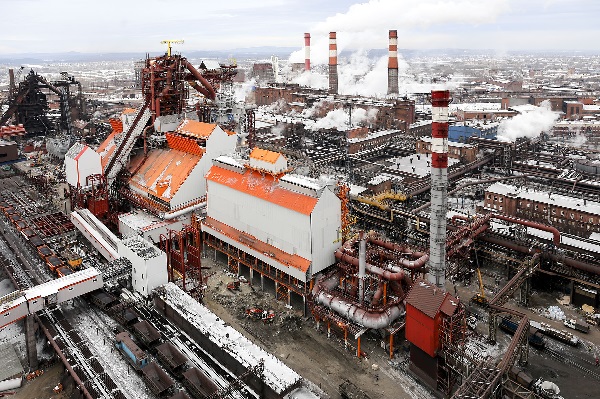 New EVRAZ NTMK N° 7 blast furnace in Russia;
Credit: Paul Wurth
New EVRAZ NTMK N° 7 blast furnace in Russia;
Credit: Paul Wurth
Under the chairmanship of Michel Wurth, the Ordinary General Meeting of shareholders of Société Anonyme Paul Wurth was held on 14 May 2019 to approve among others the financial statements for the year 2018.
The meeting highlighted the ways in which Paul Wurth will face up to the challenges for the steel industry, triggered by the "decarbonisation" and "industry 4.0" trends.
Economic climate and commercial situation
The main feature of 2018 for the Paul Wurth Group was the record volume of new orders (€553 million). This represented a considerable increase (78%) over the previous year. Almost half of the new orders came from cokemaking. These commercial successes were partly due to the fact that Paul Wurth has become a full-line supplier for cokemaking technology. In the field of blast furnace activities, Paul Wurth participates in most modernisation and relining projects in Europe and Russia thanks to its proven technologies. From a geographic perspective, the Russian territory represented the largest market in 2018 (42%) before the Group’s traditional home market Western Europe (36%).
Operational activity
Moreover, in 2018, the first reference project for the Paul Wurth/Midrex Technologies consortium, the construction of a MIDREX® direct reduction plant at Tosyali in Algeria, was successfully completed and the world’s biggest plant (2.5 million tonnes per year) was producing the first cold direct reduced iron towards the end of the year. In addition, a complex project at SAIL’s Bhilai steelworks in India was completed with the firing of the new blast furnace No. 8. With an inner volume of 4,060m3 and a hearth diameter of 13.4 metres, BF8 is now the largest blast furnace that Paul Wurth has ever commissioned in India. Paul Wurth’s state-of-the-art technologies were also used on EVRAZ NTMK’s new blast furnace No. 7 in Russia.
Results for the financial year 2018
Turnover for 2018 was €424.8 million, up by 8.5% from the level reported in 2017. Paul Wurth thus closed the financial year with a net profit of €14.1 million. The General Meeting approved the payment of an unchanged gross dividend of €52.5 per share on account of the 2018 financial year.
Towards green steel
The development and use of environmentally friendly and climate-neutral processes will characterise the steel sector, which accounts for about 7% of global CO2 emissions, over the next years. Under the Paris Climate Agreement, especially integrated steelworks must take drastic measures to meet the targets for the future reduction of CO2 emissions.
Against this backdrop, in December 2018 Paul Wurth took a minority shareholding in the German cleantech company Sunfire GmbH, which is developing its own high-temperature electrolyser to produce valuable hydrogen from steam and electricity. Before customers decide to opt for a complete change of technology, solutions to save CO2 at existing plants are needed. Currently, Paul Wurth is concentrating on developing a wide range of technological solutions designed to stepwise reduce CO2 emissions in the classic blast furnace route. The primary aim of these solutions is to achieve efficient metallurgical use of process off-gases.
Industry 4.0
The steel industry is also experiencing a profound change due to digitalisation. As such, Paul Wurth, in close cooperation with SMS group, is seeking to exploit the full potential of digital innovations by developing digital solutions based on the Group’s plant and process know-how. In its construction and infrastructure projects, Paul Wurth Geprolux will also focus more on digital tools for project management activities, technical building design and building information modelling (BIM).
Finally, to adapt to market requirements, Paul Wurth has set itself the goal of accompanying its customers on the way to sustainably optimised, CO2-free steel production with innovative technologies.








